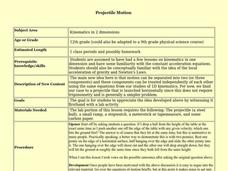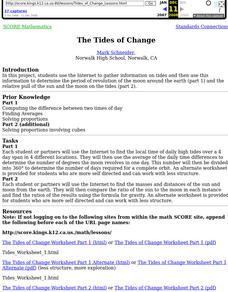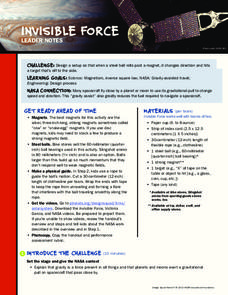Curated OER
Projectile Motion
Twelfth graders experiment with a projectile that is launched horizontally after a demonstration and small discussion about two pennies, one dropping from a table top and the other being slide off the top and hitting the ground at about...
Curated OER
Plop! Plop! Fizz! Fizz!
Fourth graders study physical and chemical weathering. They explain how the processes of weathering and erosion change and move materials that become soil. They create a K-W-L chart to show what they know and list what else they would...
Alabama Learning Exchange
This Is How We Roll!
Students research how roller coasters work. In this physics lesson, learners research the history of roller coasters and the safety factors in the design of a roller coaster on the website www.learner.org/exhibits/parkphysics. They...
Curated OER
Energy Efficiency in the Home
Students discover ways to conserve energy in their homes. In this energy efficiency lesson students analyze a set of data and design a solution that results in higher energy efficiency.
Curated OER
Tides of Change
Young scholars use the Internet to gather information on tides and then use this information to determine the period of revolution of the moon around the earth (part 1) and the relative pull of the sun and the moon on the tides (part 2).
Curated OER
Comparing The Earth And Moon
Third graders engage in a lesson that compares the Sun and Moon. They conduct research using the websites included in the lesson plan. Students read literature in order to make a connection with the new information. The plan includes...
Curated OER
How Do Geology and Physical Stream-bed Characteristics Affect Water Quality?
Students examine geological bedrock in landscape regions and collect data. In this investigative lesson students retrieve data on the Internet then interpret, and graph it.
Curated OER
Colonizing the Stars
Middle schoolers compare and contrast the size, composition and surface features of the nine planets of our solar system with the possible sizes and compositions of extra -solar planets.
Curated OER
3-2-1 Blast Off!
Fifth graders work cooperatively in groups to assemble and launch a rocket.
Curated OER
Comparative Stream Quality
Young scholars examine water quality on a nearby stream. They collect water samples and test for various factors, including any contamination from the treatment plant, and present their information in a Powerpoint presentation.
Curated OER
Scientific Inquiry: Periodic Motion
Students construct their own pendulum. In this physics lesson, students design an experiment to find the factors affecting its period. They formulate a conclusion based on experimental data.
PBS
Invisible Force
Investigate invisible forces. Young engineers design a setup that changes the direction of a steel ball using a magnetic force. The purpose of the setup is to model the gravitational pull of spacecraft by planetary bodies.
Curated OER
TE Activity: Pulley'ing Your Own Weight
Students experiment with common objects such as spools, string and soap to determine how pulleys make it easier to move large objects. They look at the difference between fixed and movable pulleys. They examine the many uses engineers...
Curated OER
Weathering and Erosion Splashdown
Fourth graders investigate how plants and their roots help slow the erosion process.
Curated OER
Doing More In Less
Students watch segments of a NASA program called "Doing More In Less". In groups, they examine the concept of human exploration and how NASA has contributed to specific research. They are introduced to new vocabulary and answer...
















